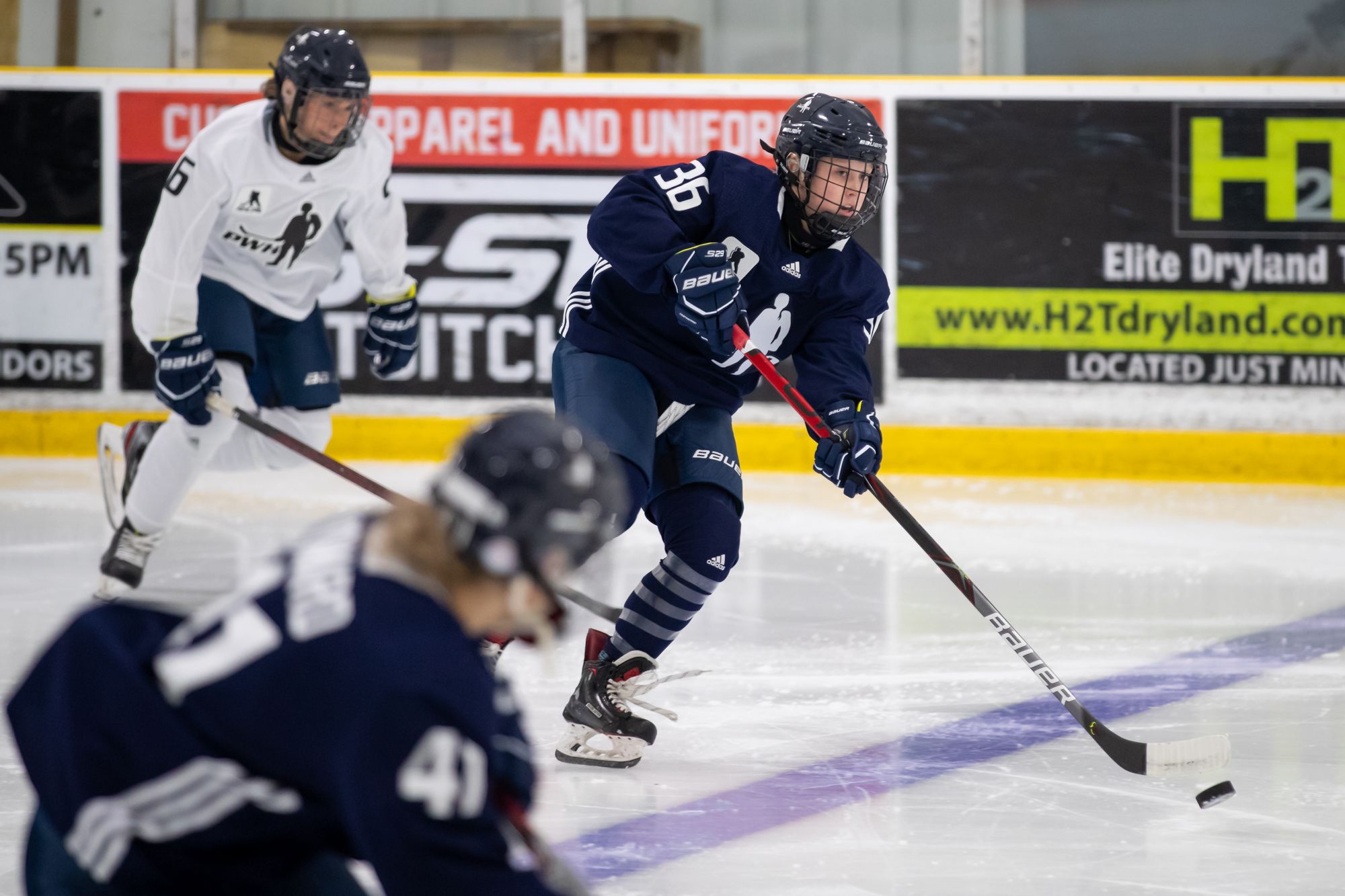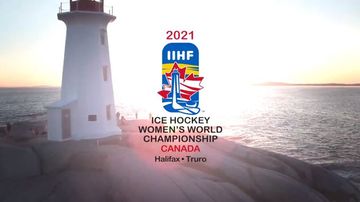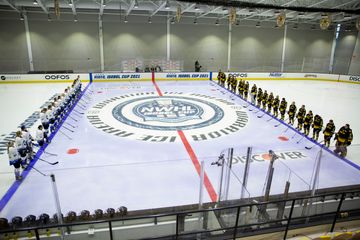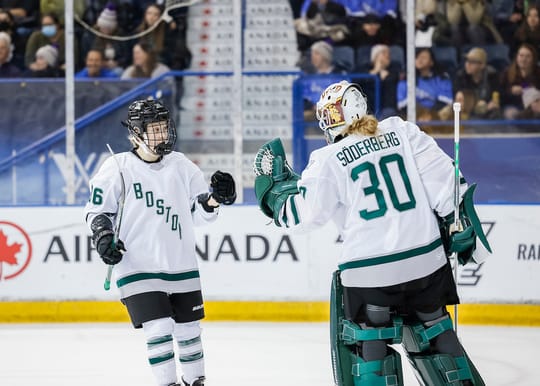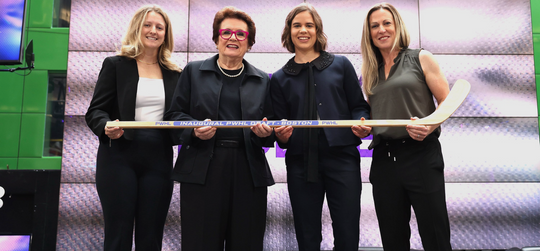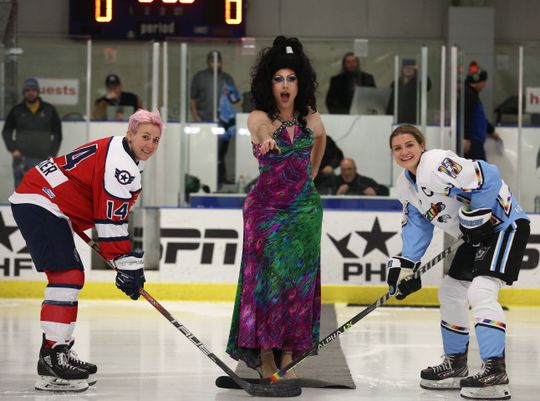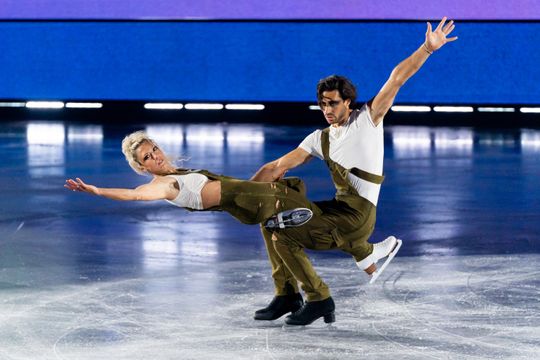Loren Gabel sits on the bench at the Family Arena in St. Charles, Missouri, breathing in and out, feeling the sticky floor beneath her skates, her legs buzzing. She can hear the gentle hum of the crowd and the voices of her teammates bouncing off the glistening ice. Her team, the Clarkson University Golden Knights, is up by one in the third period in the NCAA Division I Championship game.
With around three minutes left in the game, Gabel heads out onto the ice, heart pounding, ponytail swishing out of her helmet. The forward is skating hard towards the Wisconsin Badgers netminder, zipping up the right side of the rink, looking for linemate Cayley Mercer.
Gabel waits until nearly the last minute, sliding a cross ice pass towards Mercer right before the left winger nearly collides with the net, as the puck takes an awkward bounce over the goal line. Cheers erupt, the line comes together, clutching each other in joy.
Not long after, Mercer will whip one into the empty net with 44 seconds left in the game, before a flurry of green and gold jerseys rush out onto the ice to celebrate their win, shutting out the top-ranked Badgers. It's Gabel's first time winning the championship with her team, and the impact of the moment still sits with her.
"I was just like, is this real life right now? It was so surreal, so hard to describe," she says over the phone.
A year after that initial victory, her team did it again against the Colgate Raiders.
"I would have never thought that we'd become national champions, let alone back to back national champions," she says. "That was truly amazing and the celebration just kept going on and on."
Her voice then changes tone, as if she has just straightened her body. She only lingers on the moment — she's always thinking about what’s next. "We knew that once spring training hit that season, next season started. And I think that was a really good mindset to have. No matter what happened in that last year, we're pushing for next year."
Gabel is "what's next." She's only 23 but her resume boasts a plethora of accomplishments. Last year, she was the Eastern College Athletic Conference hockey player of the year for the second year in a row and tallied 69 points, including a Division I best of 40 goals in 38 games.
During her senior year at Clarkson, she won the Patty Kazmaier Memorial Award, given to the top player in NCAA women's hockey. The first thing she did upon accepting the award was thank her teammates.
"Never had I thought, going into college, would I have ever had a chance to be up on that stage, being presented with the trophy," she says. "I really thank my teammates for that one."
It was a proud moment for her teammates, too. Emma Keenan, a defender and roommate of Gabel's during their freshman and sophomore years at Clarkson, says she cried more than Gabel did. "We knew she deserved it, and she could win it," says Keenan, who currently plays in the Swedish Women's Hockey League in Gothenburg. "And she gave us so much credit for helping her get that award."
Keenan then snickers and says, "We would not stop calling her 'Patty' as a nickname."
Gabel's grandpa and arguably her number one fan, Norman Fitzpatrick, was there too when her name was called. He was at the hospital the night she was born, when she first laced up her skates, after practices, giving her pointers — it only made sense that he jumped from his seat, cheering, beaming at his granddaughter sitting one chair over.
"The fact that I got to be there, and to see her win it, that has to be a highlight," Norm says, as his voice breaks over the phone. "No question about it."
Gabel still can't grasp it, but she speaks with the authority of someone who deserved to win that award.
"I would describe myself as a player who is fast, has a great shot. And someone who's not afraid to learn new things. I also see the ice very well. I think that helps a lot with learning new things," she says. "I think having an open mind is very important in any sport to take criticism and turn it around to try to become a better player."
Fitzpatrick echoes his granddaughter, complimenting her skating abilities, her ability to see the ice. So does Keenan. "Not only does she have the skill set, the speed, the shot, but she has that work ethic," she says. "And I'd say that kind of intangible drive, just to be the best."
Keenan says that drive that Gabel has makes her somewhat of a silent leader. "She never had to tell people what to do, or how they should do it. But she just went out there and led by doing it herself."
Gabel ended her illustrious college career in 2019, with plans to continue with hockey. She started playing with the Professional Women’s Hockey Players Association (PWHPA) in Mississauga, Ontario – and then COVID-19 hit, jolting her career. She was just getting used to the different pace of a new league, and then she was wearing a mask at the rink, practicing three times a week, in the gym four times a week – but not playing any games.
She had plans far beyond the league too — she was invited to Team Canada's selection camp for the IIHF World Women's Championships. But the World Championships have been put on hold for the second year in a row, and the PWHPA's future plans are uncertain, too, thanks to the pandemic.
When we start discussing her professional career, she, once again, is thinking about what she’s going to do next. Her ideas for the future span beyond her own career, ideas on how to create what she refers to as a "sustainable hockey league" for women, where they can earn a living wage.
"I think that's a huge thing because some of the girls in the PWHPA that are on my team have jobs, some are teachers, some are firefighters. Some can't make practice because of that," Gabel says. "If we could create a league where we don't have to worry about a second job, that would be a huge benefit for us."
She is thinking about the fans, and how not being able to consistently reach them threatens the women’s hockey community, how the players won’t be able to continue to show sports fans that women’s hockey is just as amazing, if not more so, than men's hockey. "For those little girls that are looking up to us and want to be in our position one day, we want to create that [ideal],” Gabel says. “If we can’t create that, then honestly, why are they going to play hockey?"
Gabel believes one possible solution is combining the PWHPA and the National Women’s Hockey League (NWHL) to start an entirely new league. "Within the PWHPA, we want to create a league that's sustainable for women and you want to promote women's hockey so that little girls have something to look up to as they are going into the sport of hockey," she says.
Despite the pandemic hovering an uncertain future over her helmet, Gabel remains eternally driven. She wants to make the 2022 Olympic women's hockey team. She's going to continue with the PWHPA. She is still training and working out so she can be faster, stronger, better than she is.
"I don't think she's anywhere near the best player that she can be," Keenan says of her old roomie.
Gabel often thinks back to her years at Clarkson and still can't believe she's a two-time NCAA champion, that her teammates' voices roared with excitement as the buzzer rang in their favor, not once, but twice. She still stares at her Patty Kazmaier trophy with disbelief. Just this past November, Gabel's plans began to unroll — she was anointed a spot on the new PWHPA team, Team Sonnet, based out of Toronto.
The coach, Laura McIntosh, has seen Gabel progress over the years, before she went to Clarkson, as she used to be the skills coach for Gabel's PWHL team. She used to coach at the University of Waterloo too, near Gabel's hometown of Kitchener, and the two often participated in friendly scrimmages.
"She obviously works to get better and pushes the athletes around her to get better as well," McIntosh says. "So it's been a lot of fun getting to know her as a player and coaching her this year."
If Gabel focuses on her offensive side, she will continue to be a huge asset for Team Canada. "One of her biggest strengths is her shot and her release," McIntosh adds. “She's one of the most raw-talented players that we have on our team."
Gabel was at the National Women's Team Selection camp in Halifax in mid-April, practicing and playing games in preparation for the 2021 IIHF Women's World Championships. 47 players attended the camp, each with the hopes of making the final World Championship roster.
But on April 21, the tournament was cancelled due to safety concerns with COVID-19. The provincial government of Nova Scotia announced the Championship would no longer take place there, and the athletes were told to pack their bags and go home. While possible dates for summer in another location are being sought, there is currently no firm plan to hold the tournament.
The COVID-19 pandemic has raged on at a time when Gabel's post-collegiate career is ready to soar. In addition to its effects on the already-inconsistent resources allocated to women's hockey, the future is uncertain for Gabel and other highly skilled women's hockey players after the pandemic subsides. Men in the sport at her level haven’t felt the effects as strongly, if at all, amidst this situation.
Despite all this, Gabel will never be satisfied. There's only one direction for her to go, and that is forward.
(Photo: Anne-Marie Pellerin/PWHPA)
